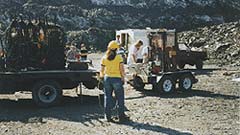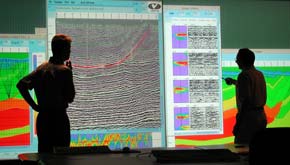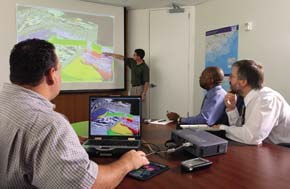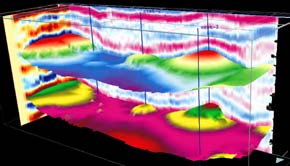Acquisition Geophysicists
The acquisition geophysicist is responsible for seismic data collection by the field seismic crew. Geophysicists determine how the program will be carried out, what energy source will be used, what recording instruments will be required and ensure that the best and sharpest possible picture of the earth is produced.
These geophysicists frequently work for acquisition companies and divide their time between office and field work, often spending weeks at a time with field crews. There is opportunity for travel around the world where they may live in field camps or small villages and face the challenge of working in the jungle, the desert, mountains, swamps or offshore at sea.
Acquisition geophysicists may also design and test new instruments, write computer software for field computers or experiment with different ways of conducting the survey.
Processing Geophysicists
The reflected seismic waves are recorded in the field and transformed into
digital recordings, which are written on computer disk in binary form. The
processing geophysicist manipulates and analyses this vast amount of information
and turns it into an image of the Earth’s subsurface. The computer systems
used are amongst the fastest, biggest and most memory intensive in the world.
Processing geophysicists use computer programs to test and revise the data
continuously. Their greatest challenge is understanding how programs affect
the data to give an accurate image of the Earth. They consult interpretation
geophysicists to ensure that all available geological information is taken
into account and the resulting image of the earth is sharp and well focused.
Processing geophysicists will be the first to 'see' this image of the Earth.
Canadian processing geophysicists have an excellent professional reputation
and, while they normally work in offices, these offices can be as close as
Calgary or in the U.S., South America, Asia, Australia or Europe.
Geophysicists with special aptitudes and interest in mathematics and computers
also work on developing new processing or interpretation software.
Interpretation Geophysicists
Interpretation geophysicists are involved in every aspect of the seismic work
from planning the survey, overseeing the data collection and interacting with
the processors through to the final interpretation. They often go to the ‘field’ to
observe the data acquisition.
Interpretation geophysicists interpret the seismic data using all available
geological information to determine the most reasonable picture of the Earth.
Interpretation is done on fast, interactive workstations and often projected
onto large screens in ‘visionariums’.
Interpretation geophysicists
frequently work as part of a team which includes geologists, engineers, land
negotiators and computer specialists. They combine
their talents to develop 'plays' and decide where to drill wells to find
new oil and gas reserves. Such teams exist in most oil companies.
Competition
between oil companies is strong and they are constantly trying out new ideas,
techniques and equipment to give them an edge in the search
for exploitable resources. The secret nature of the data is strongly
protected and all interactions are carried out in a professional, confidential
manner.










